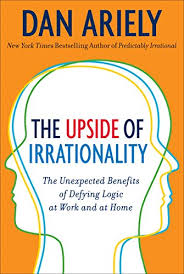Sep
29
|
Viji Kurup, MD |
 |
Upside of Irrationality
Book Author: Dan Ariely
Publisher: Harper Perennial
With a 16-hour flight before me at the airport in New York, I needed a good book to keep me company. As I was browsing through the bookstore, the title caught my eye. ‘The Upside of Irrationality’. Well, was there an upside to it? My entire life was spent listening to people extolling the virtues of being rational, of listening to your “rational brain”. I picked up the book and hoped it would keep me entertained during the waking hours of the long flight….
Dan Ariely is a Professor of Psychology at Duke and does research in behavioral economics, a background which clearly informs its writing. The first chapter on motivation already had my attention. Ariely describes his research group’s experiment, which was based on a century-old theory involving negative stimulus and learning: rats learned fastest when exposed to shocks of moderate intensity. When shocks were weak, learning was not faster, and when shocks were strong, learning suffered! As I read, I considered that the O.R. environment, potentially a high-stress atmosphere, could impair resident’s learning when stress was out of proportion. I read on...
Ariely and colleagues adapted this experiment with humans assigned complex tasks with varying financial incentives. Individuals were randomized to receive a small bonus (one day’s pay), a medium sized bonus (two weeks’ pay), or a large bonus (five months’ pay). The results had surprising correlation with the rat experiment. Performance of individuals who got the small or the moderate size bonus was similar. However, the individuals who had a large bonus at stake performed the worst. There were several lessons for me from these experiments: we have to be thoughtful in how we structure motivation at work, and we should be mindful of our learners’ stress in the perioperative environment.
Other portions of the book were also relevant for anesthesiology educators: subsequent chapters focused on the importance of finding meaning in work and, the reluctance to adopt ideas that we ourselves did not generate. Especially in this age of increased awareness of the problem of burnout, these experiments shed light on how humans value work and the effect it has on their psyche.
All in all, the various experiments described in the book kept my interest and my spirits up during the long flight, and I would recommend it to anyone who has an interest in human behavior. The book’s droll sense of humor and its innovative ideas are guaranteed to get you thinking about the way you and others around you behave. The author skillfully combines personal anecdotes with description of scientific experiments to give insight into the real-world relevance of these tests. The book will allow you to experience the world with a fresh perspective and improve understanding of human behavior at home and at work.
Share this post:



